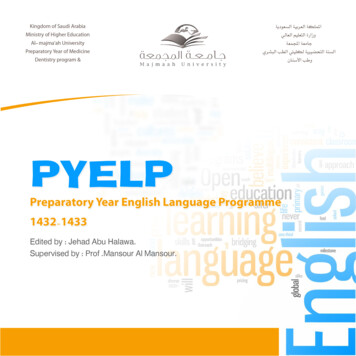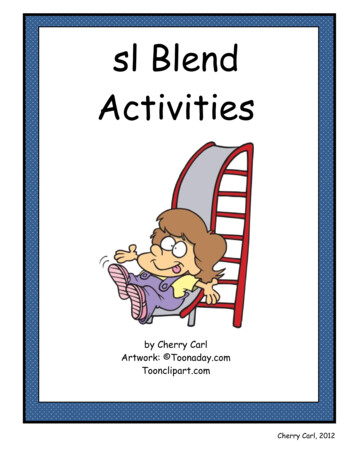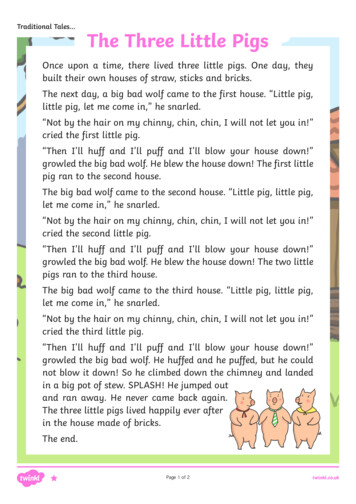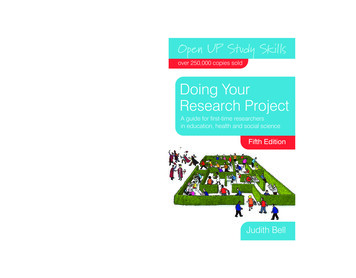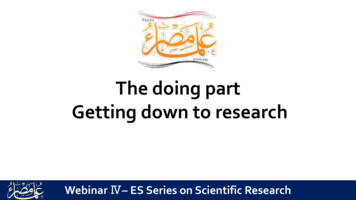
Transcription
The doing partGetting down to researchWebinar Ⅳ– ES Series on Scientific Research
البحث العلمي ليس مجرد مهنة . البحث العلمي أسلوب حياة . إلى أى مدى تتفق مع هذه المقولة ؟ 2 ES Series on Scientific Research
The doing partGetting down to research Aim of the postgraduate study. The craft of research. Life in the Lab (The scientific method into action). Scientists : Problem solvers. Top 7 tips for doing research. Research for UG.ES Series on Scientific Research3
Aim of postgraduate studies
To become a fully professional researcher which means:1 . To have a command of what is happening in your subject .3. To be able to discover where you can make a useful contribution.4. To be aware of the ethics of your profession and work within them.5. To have mastery of appropriate techniques that are currently being used,and also be aware of their limitations.6. To acquire the craft skills of research .7. To communicate your results effectively in the professional arena.ES Series on Scientific Research5
The doing partGetting down to research Aim of the postgraduate study. The craft of research. Life in the Lab (The scientific method into action). Researchers : The best problems solvers. Top 7 tips for doing research. Research for UG.ES Series on Scientific Research6
The craft of researchES Series on Scientific Research7
Research : why questions Researchgoes beyond descriptionand requires analysis Research looks for explanations,relationships, comparisons,predictions, generalizations andtheoriesES Series on Scientific Research8
ES Series on Scientific Research9
Skills map for researcherES Series on Scientific Research10
How to acquire a skill ?1. Training : Training Needs Analysis(TNA). Personal development planES Series on Scientific Research11
2. PracticePractice !Practice !Practice!ES Series on Scientific Research12
http://youtu.be/CrAohCu2LIAES Series on Scientific Research13
The doing partGetting down to research Aim of the postgraduate study. The craft of research. Life in the Lab (The scientific method into action). Researchers : The best problems solvers. Top 7 tips for doing research. Research for UG.ES Series on Scientific Research14
Life in the labThe scientific method into actionES Series on Scientific Research15
The scientific methodDefinition : A series of steps that scientistsuse to answer questions andsolve problems. There are six main steps:ES Series on Scientific Research16
The scientific method1.2.3.4.5.6.Question/Observation.Form Hypothesis.Test Hypothesis.Analyze Data.Conclusion.Communicate results.ES Series on Scientific Research17
1. Question/ObservationPose a question about an observation .ES Series on Scientific Research18
2. Form Hypothesis.Hypothesis: A possible answer to your scientific question. It is not a fact.Good hypothesis must be : testable a possible answer to your scientific question . If .then statement .ES Series on Scientific Research19
3. Test Hypothesis.TimeEthicsComplexityIs itfeasible?SkillsCapabilityResourcesES Series on Scientific Research20
Prepare for your experiment:1. Materials list.2. step-by-step proceduresinstructions.3. data chart , tables &observations.ES Series on Scientific Research21
Define Your Variables :Variables are anything thatmight impact the outcome ofyour study. Types :1. Independent variables2. Dependent variables3. Controlled variablesES Series on Scientific Research22
Standardize Your ProceduresES Series on Scientific Research23
Follow The 3 Principles of Experimental design(1) Randomization :Every experimental unithave the same chance.ES Series on Scientific Research24
(2) Local control :Control of all factorsexcept the onesabout which we areinvestigating.ES Series on Scientific Research25
(3) Replication :ES Series on Scientific Research26
The scientific method1.2.3.4.5.6.Question/Observation.Form Hypothesis.Test Hypothesis.Analyse Data.Conclusion.Communicate results.ES Series on Scientific Research27
4. Analyze Data Data :Facts gathered through your observations. Analyze :Look for patterns.Make a picture (graph) with your collecteddata or write an analysis.ES Series on Scientific Research28
ES Series on Scientific Research29
Errors !!!ES Series on Scientific Research30
Types of experimental ironmentalEnvironmentalBlundersTheoreticalES Series on Scientific Research31
The scientific method1.2.3.4.5.6.Question/Observation.Form Hypothesis.Test Hypothesis.Analyse Data.Conclusion.Communicate results.ES Series on Scientific Research32
5. Conclusion It is a summary of what you've learnt. You examine your results to see if itssupport your hypothesis. If it doesn't you may need to go back fixsome problems in your experiment andexperiment again.ES Series on Scientific Research33
6. Communicate results Sharing your ideas and results with others. Describe your procedures to others so theycan repeat it. Ways to communicate include : Meetings Scientific journals. Internet.ES Series on Scientific Research34
ES Series on Scientific Research35
What if things go wrong ?!!ES Series on Scientific Research36
ES Series on Scientific Research37
ES Series on Scientific Research38
Scientists : The Problem SolversES Series on Scientific Research39
ES Series on Scientific Research40
ES Series on Scientific Research41
Pilot studyES Series on Scientific Research42
The doing partGetting down to research Aim of the postgraduate study. The craft of research. Life in the Lab (The scientific method into action). Researchers : The best problems solvers. Top 7 tips for doing research. Research for UG.ES Series on Scientific Research43
Top 7 tips for doing your researchES Series on Scientific Research44
1. Be EnthusiasticES Series on Scientific Research45
ES Series on Scientific Research46
2.Be independentES Series on Scientific Research47
3. Manage your time effectivelyES Series on Scientific Research48
4. Be patientES Series on Scientific Research49
5 . Don’t be frustratedES Series on Scientific Research50
6. Keep your data safeES Series on Scientific Research51
7. Enjoy the experienceES Series on Scientific Research52
The doing partGetting down to research Aim of the postgraduate study. The craft of research. Life in the Lab (The scientific method into action). Researchers : The best problems solvers. Top 7 tips for doing research. Research for UG.ES Series on Scientific Research53
Research for UG1. Establish yourself in the scientific community .2. Make connections with faculty and staff.3. Develop valuable skills.4. Apply the techniques and concepts you learn in class.5. Build a well- rounded resume.6. Be prepared for graduate school.7. Give you a taste of what a career in science.8. Help you in your future career.ES Series on Scientific Research54
http://www.nsf.gov/funding/pgm summ.jsp?pims id 5517&from fundES Series on Scientific Research55
Home work Apply the scientific method a scientificexperiment based on an observation in thesurrounding environment .Present it in a mind map , a video or a report .Work individually or in groups.Be creative ES Series on Scientific Research56
Further Readings How to get a PhD : How to Get a PhD: A Handbook forStudents and Their Supervisors by Estelle Phillips The craft of research by Wayne C. Booth. Your PhD coach : how to get the PhD experience you wantby Jeff Gill authorES Series on Scientific Research57
Suggested courses1.2.3.4.5.Language courses.Project management.Problem solving.Time management.CreativityES Series on Scientific Research58
البحث العلمي ليس مجرد مهنة . البحث العلمي أسلوب حياة . 59 ES Series on Scientific Research
ES Series on Scientific Research60
ES Series on Scientific Research The doing part Getting down to research Aim of the postgraduate study. The craft of research. Life in the Lab (The scientific method into action). Scientists : Problem solvers. Top 7 tips for doing



